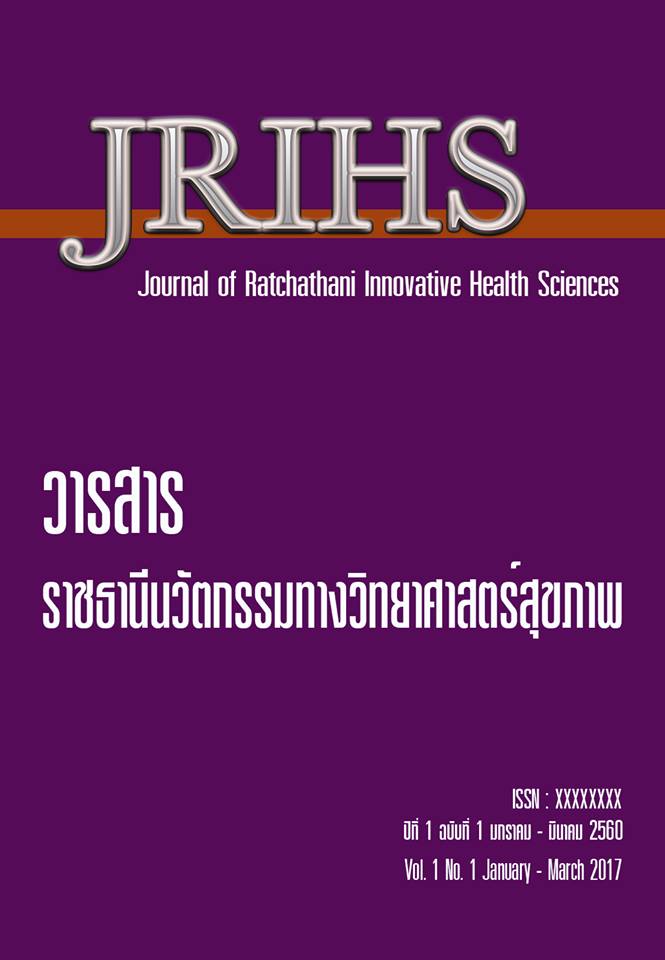Preventing health problems of childhood addicted to online games
Main Article Content
Abstract
Children develop their physical, emotional, social and intelligence skills to prepare for adulthood. They are curious to try. With the current change of environment, where computers and the Internet have become closer to the individual has had a dramatic influence on children’s behavior. Children use the Internet to expand knowledge and for entertainment. The children also got experience using the internet for playing games. Some children become addicted to the game. The online games have effects on health, brain and intelligence Including family and society. Therefore, parents should give their warm love to their children and take care closely to prevent their children from the games. For the family whose children are already addicted to the games, parents need to be strong and spend quality time with their children and find solutions together. So that they can grow properly, have good development and can live in a society with quality.
Article Details
How to Cite
เพ็งแป้น ข. (2017). Preventing health problems of childhood addicted to online games. Journal of Ratchathani Innovative Health Sciences, 1(1), 16–30. retrieved from https://he02.tci-thaijo.org/index.php/JRIHS/article/view/171116
Section
Academic Article
ความคิดเห็นและข้อเสนอแนะใดๆ ที่นำเสนอในบทความเป็นของผู้เขียนแต่เพียงผู้เดียว โดยบรรณาธิการ กองบรรณาธิการ และคณะกรรมการวารสารราชธานีนวัตกรรมทางวิทยาศาสตร์สุขภาพไม่ได้มีส่วนเกี่ยวข้องแต่อย่างใด มหาวิทยาลัยราชธานี บรรณาธิการ และกองบรรณาธิการจะไม่รับผิดชอบต่อข้อผิดพลาดหรือผลที่เกิดขึ้น จากการใช้ข้อมูลที่ปรากฏในวารสารฉบับนี้
References
กรมสุขภาพจิต, สถาบันสุขภาพจิตและวัยรุ่น. (2556). บทวิเคราะห์งานวิจัยสถานการณ์เด็กติดเกม มิถุนายน 2556. สืบค้นวันที่ 20 มีนาคม 2559 จากhttp://www.healthygamer.net/sites/default/files/scribd/bthwiekhraaahsthaankaaredktidekm_2556.pdf
จิตริน ใจดี. (2557). ปัญหาเด็กติดเกม วิธีสังเกต ป้องกันและแก้ไข. สืบค้นวันที่ 20 เมษายน 2559 จาก http://www.it24hrs.com/2014/problem-of-game/
ชาญวิทย์ พรนภดล. (2556). สิ่งที่พ่อแม่ควรและไม่ควรปฏิบัติในการดูแลเด็กไม่ให้ติดเกม (Do and Don’t) สืบค้นวันที่ 20 เมษายน 2559 จากhttp://www.healthygamer.net/download/academic/13878
ชาญวิทย์ พรนภดล และคณะ. (2557). คำแนะนำสำหรับผู้ปกครอง “เรื่องการเล่นเกมคอมพิวเตอร์ของเด็กและวัยรุ่น” พิมพ์ครั้งที่ 2. กรุงเทพมหานคร: บริษัทมีเดียโซน พริ้นติ้ง จำกัด.
นวลฉวี ประเสริฐสุข. (2551). พฤติกรรมเสี่ยงและการป้องกันในนักเรียนวัยรุ่นไทยและญี่ปุ่น. กรุงเทพฯ: มหาวิทยาลัยศิลปากร.
ประกายเพชร สุภะเกษ, สุธรรม นันทมงคลชัย และมัณฑนา ดำรงศักดิ์. (2555). ปัจจัยที่มีความสัมพันธ์ต่อการติดเกมคอมพิวเตอร์ในนักเรียนระดับชั้นประถมศึกษา. วารสารสาธารณสุขศาสตร์, 42(1); 66-77
ประเภทและชนิดของเกม. (2557). สืบค้นวันที่ 20 เมษายน 2559 จากhttp://guru.sanook.com/27010/
พรพิมล ศรีสุวรรณ. (2553). การเล่นเกมคอมพิวเตอร์ การทำหน้าที่ของครอบครัวและพฤติกรรมการส่งเสริมสุขภาพของเด็กนักเรียนประถมศึกษาปีที่ 3-6 ในโรงเรียนเขตเทศบาลนครขอนแก่น. วิทยานิพนธ์พยาบาลศาสตรมหาบัณฑิต, สาขาวิชาการพยาบาลเด็ก, บัณฑิตวิทยาลัย, มหาวิทยาลัยขอนแก่น.
วิกิพีเดีย สารานุกรมเสรี. (2559). เกมออนไลน์. สืบค้นวันที่ 20 เมษายน 2559 จากhttps://th.wikipedia.org/wiki/%E0%B9%80%E0%B8%81%E0%B8%A1%E0%B8%AD%E0%B8%AD%E0%B8%99%E0%B9%84%E0%B8%A5%E0%B8%99%E0%B9%8C
วิทยากร เชียงกูล.(2552). จิตวิทยาวัยรุ่น.กรุงเทพฯ : สายธาร
วิษณุ โคตรจรัล. (2553). Game for Fun: รู้ใจคนเล่น ใน บทย่อความจากการบรรยายในงาน TAM 2005.
ศิริไชย หงษ์สงวนศรี และพนม เกตุมาน. (2549). Game Addiction: The Crisis and solution.
ใน : สุวรรณา เรืองกาญจนเศรษฐ์, พัฒน์มหาโชคเลิศวัฒนา, บรรณาธิการ. รู้ทันปัญหาวัยรุ่นยุคใหม่. กรุงเทพฯ: บี ยอนด์เอ็นเทอร์ไพรซ์.
ศุภัคนิจ วิษณุพงษ์พร. (2552). พฤติกรรมการเล่นเกมออนไลน์ที่ส่งผลต่อการเรียนของเด็กนักเรียนมัธยมศึกษาตอนต้น. วิทยานิพนธ์การศึกษามหาบัณฑิต, สาขาวิชาการจัดการสาธารณะ, บัณฑิตวิทยาลัย, มหาวิทยาลัยบูรพา.
ศูนย์กลางความรู้แห่งชาติ. (2554). รายงานการใช้อินเทอร์เน็ตหรือคอมพิวเตอร์ของบุตรหลาน/สมาชิกในครอบครัว
สยาม อุทัยบุญยะลาภา. (2553). สัมภาษณ์ประธานชมรมผู้ประกอบการร้านอินเทอร์เน็ต และ เกมจังหวัดสุราษฎร์ธานี
สิริวรรณ ปัญญากาศ. (2551). ความสัมพันธ์ระหว่างความรุนแรงในสื่อเกมออนไลน์กับพฤติกรรมก้าวร้าวของเด็กวัยรุ่นตอนปลายในจังหวัดเชียงใหม่. มหาวิทยาลัยเชียงใหม่. สำนักหอสมุด.
โสรัจจะ จันทร์แสงศรี, กนกพร กันทาและภูมิพิพิธ วณิชธรรม. (2553). สภาพการดำเนินชีวิตครอบครัวที่มีเด็กติดเกมทั้งด้านบวกและด้านลบและบริการสวัสดิการสำหรับครอบครัว. สถาบันวิจัยพฤติกรรมศาสตร์, มหาวิทยาลัยศรีนครินทรวิโรฒ.
หมอชาวบ้าน. (2553). เกมกับสุขภาพ... เด็ก สืบค้นเมื่อวันที่ 20 เมษายน 2559จาก https://www.doctor.or.th/article/detail/10736
อดิศักดิ์ ผลิตผลการพิมพ์. (2558). การสัมมนาวิชาการเฉพาะประเด็น “การจัดการสภาพแวดล้อม
รอบตัวเด็ก 24 ชั่วโมง : กรณีเด็กกับไอที. สืบค้นวันที่ 20 เมษายน 2559 จาก http://crtremote.blogspot.com/
อรรคพล ศิวนาท. (2554). ผลกระทบของการติดเกมคอมพิวเตอร์ที่มีต่อเด็กนักเรียนในเขตกรุงเทพมหานคร. สารนิพนธ์รัฐประศาสนศาสตรมหาบัณฑิต มหาวิทยาลัยเกริก.
Anderson, C. A., Gentile, D. A., & Buckley, K. E. (2007). Violent video game effect on children and adolescents: Theory, research, and public policy. New York: Oxford University Press.
Busch, V., Van, S. H. F., Leeuw, J. R. J., & Schrijvers, A. J. P. (2013). Clustering of health related behaviors, health outcomes and demographics in Dutch adolescents: A cross sectional study. BMC Public Health; 13, 1118.
Funk, J. B. (2005). Video games. Journal of Adolescent Medicine Clinics; 16(2), 95-411.
Gillman, M., Rifas-Shiman, S., Frazier, L., Rockett, H., Camargo, C., Field, A. (2000). Family dinner and diet quality among older children and adolescents. Journal of Arch FamMed.
Griffiths, M., & Hebert, M. (2002). Game and gaming addictions in adolescence. Melden: BPS. Backwell.
Kim, E. J., Namkoong, K., Ku, T., & Kim, S. J. (2008). The relationship between online game addiction and aggression, self-control and narcissistic personality traits. European Psychiatry, 23(3), 212-218.
จิตริน ใจดี. (2557). ปัญหาเด็กติดเกม วิธีสังเกต ป้องกันและแก้ไข. สืบค้นวันที่ 20 เมษายน 2559 จาก http://www.it24hrs.com/2014/problem-of-game/
ชาญวิทย์ พรนภดล. (2556). สิ่งที่พ่อแม่ควรและไม่ควรปฏิบัติในการดูแลเด็กไม่ให้ติดเกม (Do and Don’t) สืบค้นวันที่ 20 เมษายน 2559 จากhttp://www.healthygamer.net/download/academic/13878
ชาญวิทย์ พรนภดล และคณะ. (2557). คำแนะนำสำหรับผู้ปกครอง “เรื่องการเล่นเกมคอมพิวเตอร์ของเด็กและวัยรุ่น” พิมพ์ครั้งที่ 2. กรุงเทพมหานคร: บริษัทมีเดียโซน พริ้นติ้ง จำกัด.
นวลฉวี ประเสริฐสุข. (2551). พฤติกรรมเสี่ยงและการป้องกันในนักเรียนวัยรุ่นไทยและญี่ปุ่น. กรุงเทพฯ: มหาวิทยาลัยศิลปากร.
ประกายเพชร สุภะเกษ, สุธรรม นันทมงคลชัย และมัณฑนา ดำรงศักดิ์. (2555). ปัจจัยที่มีความสัมพันธ์ต่อการติดเกมคอมพิวเตอร์ในนักเรียนระดับชั้นประถมศึกษา. วารสารสาธารณสุขศาสตร์, 42(1); 66-77
ประเภทและชนิดของเกม. (2557). สืบค้นวันที่ 20 เมษายน 2559 จากhttp://guru.sanook.com/27010/
พรพิมล ศรีสุวรรณ. (2553). การเล่นเกมคอมพิวเตอร์ การทำหน้าที่ของครอบครัวและพฤติกรรมการส่งเสริมสุขภาพของเด็กนักเรียนประถมศึกษาปีที่ 3-6 ในโรงเรียนเขตเทศบาลนครขอนแก่น. วิทยานิพนธ์พยาบาลศาสตรมหาบัณฑิต, สาขาวิชาการพยาบาลเด็ก, บัณฑิตวิทยาลัย, มหาวิทยาลัยขอนแก่น.
วิกิพีเดีย สารานุกรมเสรี. (2559). เกมออนไลน์. สืบค้นวันที่ 20 เมษายน 2559 จากhttps://th.wikipedia.org/wiki/%E0%B9%80%E0%B8%81%E0%B8%A1%E0%B8%AD%E0%B8%AD%E0%B8%99%E0%B9%84%E0%B8%A5%E0%B8%99%E0%B9%8C
วิทยากร เชียงกูล.(2552). จิตวิทยาวัยรุ่น.กรุงเทพฯ : สายธาร
วิษณุ โคตรจรัล. (2553). Game for Fun: รู้ใจคนเล่น ใน บทย่อความจากการบรรยายในงาน TAM 2005.
ศิริไชย หงษ์สงวนศรี และพนม เกตุมาน. (2549). Game Addiction: The Crisis and solution.
ใน : สุวรรณา เรืองกาญจนเศรษฐ์, พัฒน์มหาโชคเลิศวัฒนา, บรรณาธิการ. รู้ทันปัญหาวัยรุ่นยุคใหม่. กรุงเทพฯ: บี ยอนด์เอ็นเทอร์ไพรซ์.
ศุภัคนิจ วิษณุพงษ์พร. (2552). พฤติกรรมการเล่นเกมออนไลน์ที่ส่งผลต่อการเรียนของเด็กนักเรียนมัธยมศึกษาตอนต้น. วิทยานิพนธ์การศึกษามหาบัณฑิต, สาขาวิชาการจัดการสาธารณะ, บัณฑิตวิทยาลัย, มหาวิทยาลัยบูรพา.
ศูนย์กลางความรู้แห่งชาติ. (2554). รายงานการใช้อินเทอร์เน็ตหรือคอมพิวเตอร์ของบุตรหลาน/สมาชิกในครอบครัว
สยาม อุทัยบุญยะลาภา. (2553). สัมภาษณ์ประธานชมรมผู้ประกอบการร้านอินเทอร์เน็ต และ เกมจังหวัดสุราษฎร์ธานี
สิริวรรณ ปัญญากาศ. (2551). ความสัมพันธ์ระหว่างความรุนแรงในสื่อเกมออนไลน์กับพฤติกรรมก้าวร้าวของเด็กวัยรุ่นตอนปลายในจังหวัดเชียงใหม่. มหาวิทยาลัยเชียงใหม่. สำนักหอสมุด.
โสรัจจะ จันทร์แสงศรี, กนกพร กันทาและภูมิพิพิธ วณิชธรรม. (2553). สภาพการดำเนินชีวิตครอบครัวที่มีเด็กติดเกมทั้งด้านบวกและด้านลบและบริการสวัสดิการสำหรับครอบครัว. สถาบันวิจัยพฤติกรรมศาสตร์, มหาวิทยาลัยศรีนครินทรวิโรฒ.
หมอชาวบ้าน. (2553). เกมกับสุขภาพ... เด็ก สืบค้นเมื่อวันที่ 20 เมษายน 2559จาก https://www.doctor.or.th/article/detail/10736
อดิศักดิ์ ผลิตผลการพิมพ์. (2558). การสัมมนาวิชาการเฉพาะประเด็น “การจัดการสภาพแวดล้อม
รอบตัวเด็ก 24 ชั่วโมง : กรณีเด็กกับไอที. สืบค้นวันที่ 20 เมษายน 2559 จาก http://crtremote.blogspot.com/
อรรคพล ศิวนาท. (2554). ผลกระทบของการติดเกมคอมพิวเตอร์ที่มีต่อเด็กนักเรียนในเขตกรุงเทพมหานคร. สารนิพนธ์รัฐประศาสนศาสตรมหาบัณฑิต มหาวิทยาลัยเกริก.
Anderson, C. A., Gentile, D. A., & Buckley, K. E. (2007). Violent video game effect on children and adolescents: Theory, research, and public policy. New York: Oxford University Press.
Busch, V., Van, S. H. F., Leeuw, J. R. J., & Schrijvers, A. J. P. (2013). Clustering of health related behaviors, health outcomes and demographics in Dutch adolescents: A cross sectional study. BMC Public Health; 13, 1118.
Funk, J. B. (2005). Video games. Journal of Adolescent Medicine Clinics; 16(2), 95-411.
Gillman, M., Rifas-Shiman, S., Frazier, L., Rockett, H., Camargo, C., Field, A. (2000). Family dinner and diet quality among older children and adolescents. Journal of Arch FamMed.
Griffiths, M., & Hebert, M. (2002). Game and gaming addictions in adolescence. Melden: BPS. Backwell.
Kim, E. J., Namkoong, K., Ku, T., & Kim, S. J. (2008). The relationship between online game addiction and aggression, self-control and narcissistic personality traits. European Psychiatry, 23(3), 212-218.


